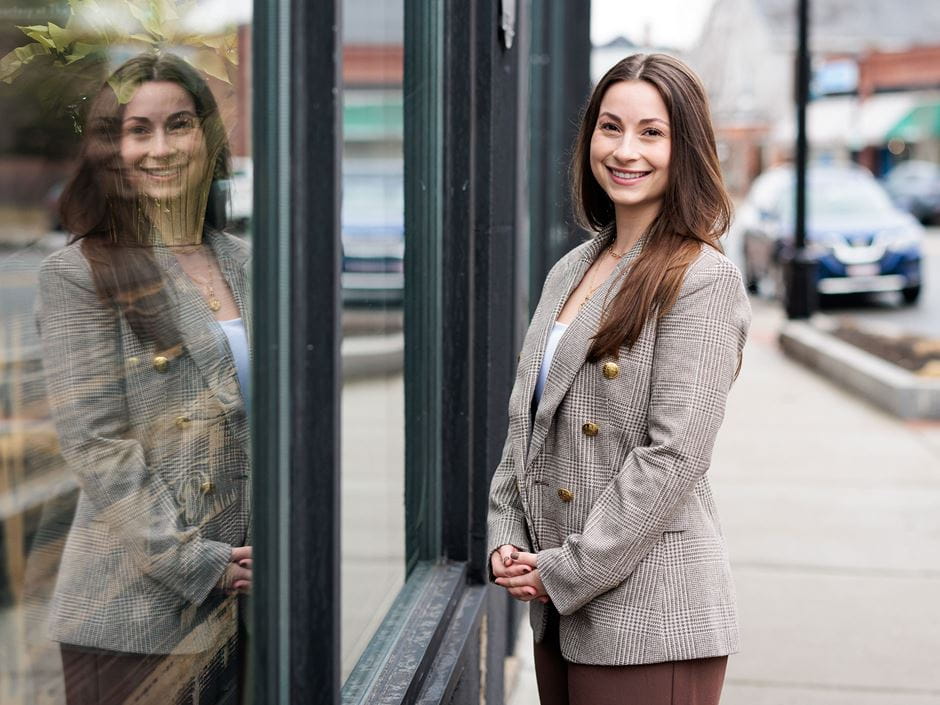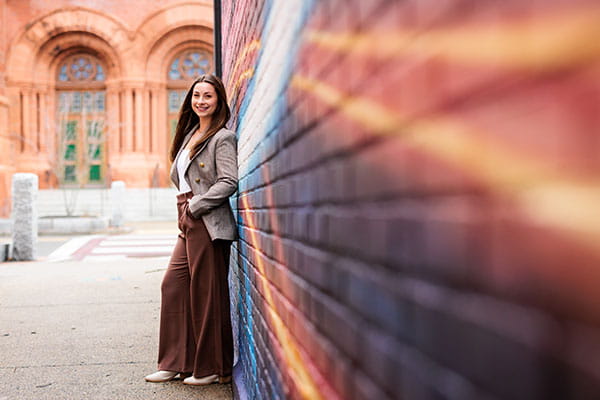What Do Healthy Relationships Look Like? That Question is this Alumna’s Job

At just 13, Mya Kermelewicz ’21 M’22 found herself in an abusive relationship.
Even with loving and communicative parents, it was difficult to understand as a young person what a healthy relationship was supposed to look like. That got even cloudier as the intricacies of teen dating evolved with the rise of social media and issues like boundary-setting, yet none of it was talked about in school, or even among her peers.
According to the Centers for Disease Control and Prevention, 26% of women experience intimate partner violence before the age of 18. Despite these statistics, young people aren’t given enough resources and tools to effectively and healthily navigate the complex world of romantic relationships and intimate partner violence.
After exiting her relationship, Kermelewicz came to understand the abuse she’d endured, even joining a support group and writing about her experiences.
Kermelewicz, who grew up in Amesbury, Mass., shared one of her poems with a teacher who then anonymously shared it with the Jeanne Geiger Crisis Center, a Massachusetts-based organization offering resources and programs to help heal adult and child survivors and inform young people about healthy relationships. Each year, the center hosts a White Ribbon Breakfast and fundraiser and invited Kermelewicz to read her poem.
“I had no idea what the White Ribbon Breakfast was, I had no idea what I was doing,” she said. “And then I just said, ‘I’m gonna go for it,’ and it ended up being really impactful.”
The center raised a record-breaking amount of money and invited Kermelewicz to continue sharing her story, only this time with students at local schools throughout the area. That’s when she realized that teen dating violence was shockingly prevalent.
“I’d get hundreds of DMs after visiting a school,” she said. “They’d say, ‘I experienced the same exact thing. I had no idea I was in an abusive relationship.’ ‘You just saved my friend.’ And then I just knew: I need to keep doing this.”

As an Endicott undergraduate majoring in psychology and a creative arts minor, Kermelewicz continued her volunteer work in schools—and then the pandemic struck.
In those early days, with people quarantined inside for safety, many organizations lost funding and in-person programming dropped off as a result.
“Nobody was implementing programs within schools, so, it kind of opened up a market for me,” she said.
Local schools soon began reaching out to Kermelewicz, who offered her services on a volunteer basis. While working in those schools, she often had lines out the door.
She also had an idea—teaching young people about healthy relationships could be a viable business.
After graduating in 2021, Kermelewicz enrolled in Endicott’s MBA program and worked as a graduate assistant for the College’s Internship & Career Center, while refining her business plan for MK Prevention Services along the way.
In 2022, Kermelewicz placed third at Spark Tank, sponsored by Endicott’s Colin and Erika Angle Center for Entrepreneurship, where she wowed the judges with her mission that filled a void for consent and dating violence education in schools.
“I thought I did horribly,” Kermelewicz recalled. “I had never pitched myself! I was only a month into the idea, but my friend was hosting Spark Tank and said, ‘You should just go for it.’”
These days, though, MK Prevention Services is busier than ever. Kermelewicz is now a Title IX advocate and relationship coach and offers year-round support to schools.
“I’m not just talking about sexual assault and dating violence, but the root of healthy and unhealthy relationships and communication,” she said. “I also dive into bystander prevention, reporting, and mental health. It’s a super broad scope of all of the underlying information and skills and knowledge that you need to understand healthy and unhealthy relationships.”
These are serious matters, and that’s where Kermelewicz’s creative arts therapy minor plays a valuable role.
“Talking can be a very vulnerable space for a lot of people. A lot of times, it’s so much easier for people to create rather than talk. Creative arts therapy allows for expression through creation. Just don’t call it therapy!” she laughed.
And while young women especially share their concerns with Kermelewicz, she also helps many young men.
“There’s a stereotype that you need to be this societal definition of masculine—but it’s okay to cry and to have feelings and for you to feel violated or feel that you’re being abused or in an unhealthy relationship,” she said. “Men don’t feel like they can speak out, because that takes away part of their masculinity. In reality, we should be encouraging them to use their voice not only for themselves but to help protect and be an ally for women.”
Kermelewicz goes into every presentation and school visit with the goal of reaching just one person.
“If I can impact just one person’s life every time I speak, that’s enough for me, that’s worth it,” she said.
But her ultimate objective is curriculum change—incorporating consent, sexual assault, and healthy relationship education into schools.
“Social media plays a massive role in relationships today, but no one’s shown how to navigate relationships, in-person or online,” she said. “Having schools realize, ‘This is what we need, and we need to start educating young,’ to me would be my end goal.”
If you are experiencing abuse, you are not alone and help is available. Here are a few of Kermelewicz’s favorite resources.